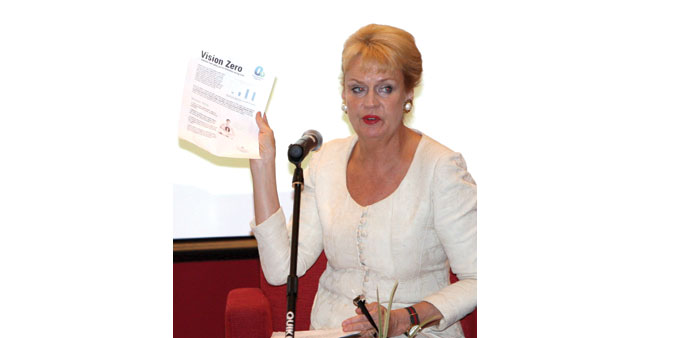By Ayman Adly/Staff Reporter
Qatar is expected to benefit hugely by adopting the proven traffic safety management system of Sweden, which at 2.7 deaths per 100,000 inhabitants , has one of the lowest fatality rates in the world
Traffic and road safety experts from Sweden and Qatar are set to discuss measures for bringing down the number of road traffic accidents in the country at a two-day meeting starting in Doha today .
Qatar is expected to benefit hugely by adopting the proven traffic safety management system of Sweden, which at 2.7 deaths per 100,000 inhabitants , has one of the lowest fatality rates in the world.
The two-day “Vision Zero Qatar-Sweden Power Talk” is the result of regular meetings held between the two sides on the initiative of HE the Prime Minister and Minister of Interior Sheikh Abdulla bin Nasser bin Khalifa al-Thani since the beginning of this year. Swedish parliament adopted the Vision Zero policy in 1997 which states that “no one should be killed or seriously injured as a result of traffic accidents in the road transport system”.
Addressing a press conference where the “power talk” was announced yesterday, Swedish ambassador Ewa Polano said she was extremely glad that the Prime Minister had invited a delegation of Swedish experts to Doha to explore ways to realise Qatar’s ambitious goals on road safety and traffic medicine.
The conference is to be held under the patronage of HE Sheikh Abdulla.
“Since the start of this year, at least one meeting was held every week between Qatari and Swedish embassy officials to discuss ways of enhancing co-operation between the two countries and involving the private sector on the issue of road safety. Also, a memorandum of understanding was signed between the two parties to further co-operate on the issue,” the envoy said.
Ambassador Polano saw a clear potential for the huge success of the Vision Zero strategy in Qatar. “I have been driving here for only a few months and I have had a couple of accidents, so I believe Swedish expertise will be highly helpful here.”
Leading Swedish companies are to submit their innovative technological solutions at the meetings.
The briefing was attended by Traffic Department director Brigadier Mohamed Saad al-Kharji, National Traffic Safety Committee (NTSC) secretary-general Brigadier Mohamed Abdulla al-Malki, Maersk Oil Qatar deputy managing director Sheikh Faisal bin Fahd al-Thani and Medical Rehabilitation director at the Hamad Medical Corporation (HMC) Dr Wafaa al-Yazidi.
Brigadier al-Kharji said the conference was an excellent opportunity to learn the successful experiences of Sweden in traffic safety. He said the possibility of applying such experiences in Qatar would be discussed by local officials and nine of the most renowned Swedish experts in the field.
Brigadier al-Malki said the NTSC was keen to implement the recommendations of the conference as Qatar had short and long-term plans of five and 10 years to attain a target of a maximum road fatality rate of six deaths per 100,000 inhabitants.
“During 2014, there were eight deaths per 100,000, which shows a declining trend compared to the previous years and taking into consideration the sudden increase in the population and the number of vehicles. We have 220 action plans to enhance road safety and we are constantly achieving positive results,” said Brigadier al-Malki.
According to him pedestrian fatalities account for up to 35% of the road accident deaths in the country, followed by driver and passenger deaths.
“In collaboration with the Public Works Authority (Ashghal) we have studied around 30 blackspots around the country from where pedestrian fatalities are reported often. Accordingly, 15 pedestrian overbridges are scheduled for construction and one of them is nearing completion in the Industrial Area. We are tracking all the blackspots and working out practical solutions,” he said.
Dr Wafaa al-Yazidi said Vision Zero could be comfortably integrated into Qatar Vision 2030 because it focused on man and the importance of human life above all. She said that this safety strategy took into consideration the main factors of the process: man, vehicles, road design and related legislations.
In this regard, the World International Traffic Medicine Association (ITMA) Congress will be held in Qatar on November 16 for the first time in the Middle East, she said.
“Also the newly-established Qatar Mobility Centre will evaluate motorists from the behavioral, physical, psychological and general health perspectives to determine the degree of their fitness to drive on the roads,” she added.
Sheikh Faisal stressed the commitment of Maersk Oil Qatar to enhance road safety in the country and said the company’s participation in the conference was part of its corporate social responsibility programme.

